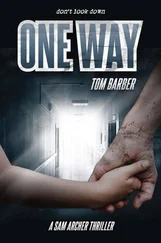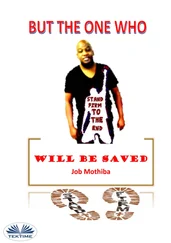After a moment’s reflection, Frank concluded: “I’m not a fan. But I factored the possibility in when I pulled the trigger, and now? I don’t see I have much of a choice.”
Mark took one of his elegant fingers and circled it around the seven-pointed star on the cardboard file’s cover. “I might be able to help you,” he said. “I might be able to give you a choice.”
“And how would you do that?” Frank raised his hands, and eased them down again, slowly enough for every link of the chain that bound him to the table to catch against the edge of the hole, then fall. “ Why would you do that?”
“A private company owns this prison, and runs it on behalf of the state.”
“There’s a logo on everything I’m wearing. Few years back, the logo changed, but it was the same old prison walls. You’re telling me a lot of things I already know, Mark. I’m still waiting for you to tell me things I don’t.”
“You don’t want to hear me out?” said Mark. “That’s OK. That’s your right. But what if it’s something you might be interested in?” He sat back in his chair, and examined his pampered hands.
Frank put on his compliant face again. Inside, he was mildly irritated, but no more than that. “You asked for me, remember? Not the other way around. So, this company, this Panopticon? You work for them?”
“Technically, no. But I’ve been authorized by their parent company to see if you’d be interested in an offer. And before I tell you what it is, I want to tell you what it isn’t.” He left a gap to see if Frank said anything, but that wasn’t Frank’s style. “This isn’t a pardon. You’ll remain guilty of second-degree murder. This isn’t commuting your sentence. You’ll serve the rest of your hundred and twenty years. This isn’t parole. You’ll be at all times under a prison regime. Neither will you get time off for good behavior.”
Frank considered what he’d heard so far. “Go on,” he said. “You’re really selling it to me.”
“We can’t give you any of those things because we’re not allowed to. The State of California—the law—wouldn’t permit us to cut such a deal with you. What we can offer you is a transfer.”
“Panopticon have another jail somewhere else?”
Mark pursed his lips. It was the first emotional response he’d really shown. Frank thought him, despite the expensive suit, the leather briefcase and the manicured hands, or perhaps because of them, a cold fish. A dead fish, even. “In a manner of speaking.”
“So why don’t you just transfer me? You don’t need my permission to do that.”
“No, that’s true enough. We need your co-operation, though.”
“Do you? I’m not really getting this whole thing, and you seem a straight-up kind of guy, so why not just lay it out?”
Mark doodled with his finger on the cover of Frank’s file again. “Given everything I’ve said, are you still in?”
“In for what? All you’ve told me is that I’m still going to die in jail. Does it really matter where the jail is?”
“You weren’t just chosen at random, Frank. You have skills. A lot more than many—most—of the inmates incarcerated here. Skills that are going to waste. Would you like to use them again?”
“You want me to build you the prison that I’m going to die in?”
“In a manner of speaking,” Mark said again.
Frank tried to sit more comfortably in his chair, but his chained hands wouldn’t let him. He frowned at the pristine Mark opposite him. “And this is to save you money?”
“To save the parent company money,” Mark corrected him. “Yes, that’ll happen.”
“Mark, I have to say I’m struggling to understand what’s in this for me.”
“The benefits will be: better food, better accommodation, a small team to work with, a challenging, stimulating environment, an utterly unique project, and considerable personal autonomy. It won’t feel like jail. It certainly won’t feel like the regime you’re under now, that I can guarantee you.”
“But I still wouldn’t be able to leave, would I?”
“No. This would be a transaction where you’d have to remain on the site in order to help maintain it,” said Mark. “That doesn’t mean there wouldn’t be free time for you to, how do I put it, enjoy the surrounding countryside. You’d always have to return, though. It’s in a somewhat isolated position, and there’s literally nowhere else to go.”
“Where is this, then? The desert?”
“Initially, yes. You’ll need to undergo some specialist training at a privately owned facility. Medical tests, too. If you refuse to co-operate in or fail to complete any of the tasks the company set, you’ll be bounced straight back here. No appeal. No hesitation, either. Likewise, if you fail on medical grounds.” Mark put his hands back flat on the folder. “Are you still interested?”
“Without committing myself, yes, sure. I’m still waiting for the sucker punch, though. Tell me there’s a sucker punch.”
“If you accept the conditions I’ve already stipulated, then I’ll outline the project more explicitly.”
“You’re starting to sound like a lawyer.”
Mark gave his tell again, and said nothing other than: “Do you accept the conditions?”
“OK.”
“Yes?” He was playing games with the language, and it seemed Frank had to play along too. This was legal boilerplate, and it had suddenly become obvious that this whole conversation was being recorded.
“Yes. I accept the conditions,” he intoned.
Mark took a deeper breath, and Frank felt like he’d crossed some sort of threshold, an invisible line in his life. A faint wash of sweat broke out across his face, and his hands grew slick.
“Your training will take almost a year. There’s a specific deadline we can’t go beyond, and either you’re ready, or you’re not. The training facility is, yes, in the desert. There’s some very specialized equipment you’ll need to be totally familiar with, and your background in construction and project management will hopefully mean you won’t have a problem with that. You’ll be introduced to the rest of your team, and you’ll learn to work together, learn to trust each other, learn to rely on each other.”
“How many?”
“Eight altogether.”
“And are they in the same position I am?”
“Seven of them, yes. One company employee will be on site to oversee the project.”
“Will the others be ex-prisoners too?”
“Serving prisoners.”
“And they have to stick around after we’ve finished this building work, too?”
“Yes.”
Frank looked over to the bright window, then back. “I’d better like them, then.”
“That’s not the company’s concern. Merely whether you can work with them.”
“So where is this place, that you want to send seven cons to, to build you a prison and then stay there for the rest of their lives?”
“Mars.”
Frank turned to the window again, and stared at the blurred parallel lines of the bars that divided the outside from the inside. There were seven of them, maybe six inches apart. They’d be iron, swollen with rust, peeling and flaking paint pushing off their surfaces like sloughing skin. “You did say Mars, right? As in the planet?”
“Yes. The planet Mars.”
Frank thought about it a little longer. “You have got to be fucking kidding me.”
“I assure you the offer is most genuine.”
“You want a bunch of cons to go to Mars? And build a prison? And then stay there?”
Mark wiped his hands on his suit trousers, a luxury that Frank didn’t have. “It’s not designated as a prison, but as a federal scientific facility. Let me explain, in order. A convict crew will be sent to Mars. Once there, they will construct a base from prefabricated parts and make it habitable. When the facility is finished, the crew will continue to live on Mars and serve out the rest of their sentences, helping to maintain the facility, expanding it as and when required, and assisting visiting civilian scientists in their work. That the facility will also be your prison is, I suppose, a somewhat technical detail. But as I’ve already explained, there’ll be nowhere to escape to.”
Читать дальше












